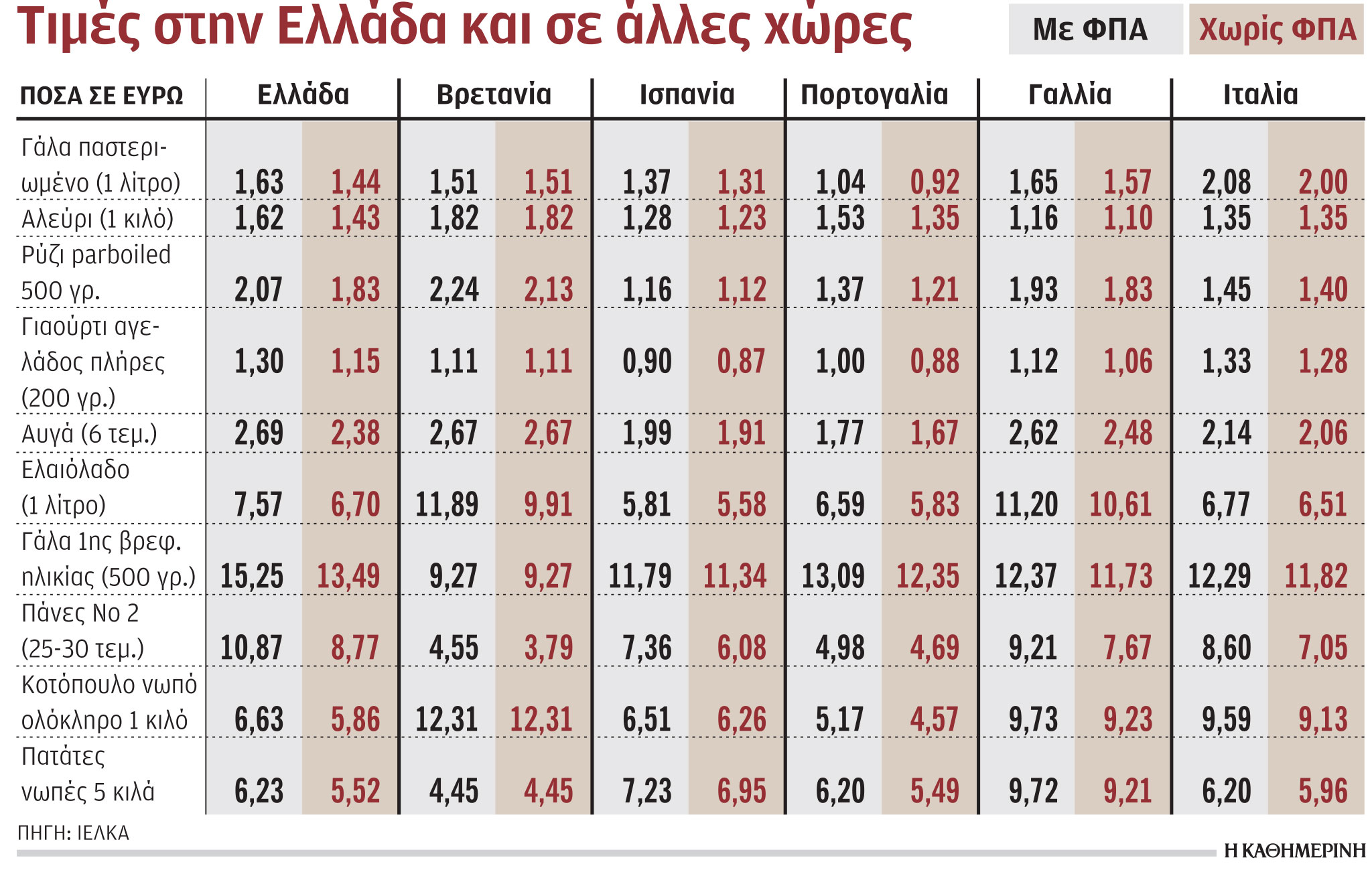
More accurately in line standardized productsboth domestic and imported, even after deducting VAT Hellasa fact that should probably worry the relevant ministry and market participants in general.
Now basic products such as milk, flour, rice, eggs and a number of others are much more expensive in Greece, and we pay more for olive oil than in all other olive-producing countries in Europe.
This is the result of a detailed study of the prices presented yesterday by the Ministry of Development at a press conference, the prices obtained as a result of an extensive study carried out by Research Institute for Consumer Goods Retailing (IELKA). And it may happen that the total “basket” calculated by IELKA turns out to be the second cheapest after Spain, however, if you remove chicken, fruits and vegetables and … cod from the “basket”, then the result of the comparison is more of a concern.
In fact, it should be clarified that out of 5000 invoices issued by IELKA, the number of common codes, i.e. identical goods was very small, about 10%. The prices presented in the review are the average prices of the products reviewed in each of the 41 product categories and include branded products, private labels, and of course products of varying quality. Excluded only products that are clearly more expensive, such as organic.
According to the results of the IELKA investigation presented yesterday by the Minister of Development Adonis Georgiades, the value of the “basket” in Greece from a comparison of average prices in 41 product categories is in Greece 155.8 euros with VAT and 134.1 euros without VAT, the second cheapest, i.e. after Spain (154.7 euros with VAT, but 142.4 euros without VAT). . In Portugal, the cost of the “basket” is 157.7 euros with VAT and 139.1 euros without VAT, in the UK 167.8 euros with VAT and 156.9 euros without VAT, in France 179.7 euros with VAT and 165 euros without VAT and in Italy 163.7 euros. with VAT and 151.2 euros without VAT.
Milk, flour, rice, eggs are much more expensive, and the price of olive oil is the highest among all other olive-producing countries.
However, when asked about the issue of VAT and the possibility of reducing it, the Minister of Development, accusing SYRIZA of hypocrisy, recalling that (and) VAT was increased during his administration, indicated that its reduction would have large financial consequences. and that all institutions, including the European Central Bank, recommend targeted measures rather than general measures.
However, in addition to the total cost of the “basket”, let’s look at the individual items. In 25 out of 41 product categories, prices in Greece are either the highest or second among the six countries compared.
Fresh milk in Greece is sold at €1.63/litre, in England €1.51/litre, in Spain €1.37/litre, in Portugal €1.04/litre, and in France €1.65/litre. , a country of course with a much higher price. per capita income.
Yoghurt, which we export to a large extent from Greece to countries such as Italy and England, is sold in Greece at €1.30 (pack of 200g), in England €1.11, in Spain €0.90, in Portugal €1. euro, in France. 1.12 euros, and in Italy 1.33 euros. Eggs, which are also not imported and are not the product of multinational corporations, are sold in Greece at a price of 2.69 euros (6 pieces), which is the highest price among 6 countries.
Baby milk, despite being sold in supermarkets for several years, is sold in Greece for about 6 euros more than in other countries. Greece is also more expensive in non-food categories such as toilet and kitchen paper, detergents, baby wipes, baby diapers.
Source: Kathimerini
Lori Barajas is an accomplished journalist, known for her insightful and thought-provoking writing on economy. She currently works as a writer at 247 news reel. With a passion for understanding the economy, Lori’s writing delves deep into the financial issues that matter most, providing readers with a unique perspective on current events.